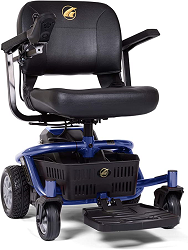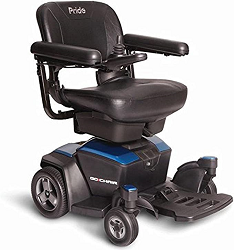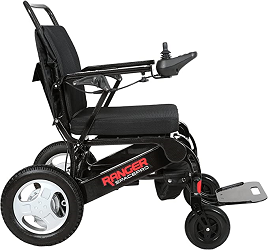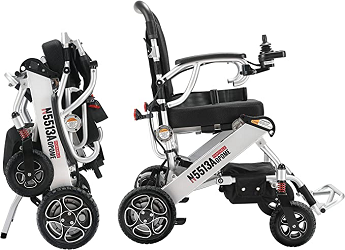Power Wheelchairs
As an Amazon Associate we earn from qualifying purchases
Shop The Porto Mobility 2023 Ranger SpacePro
(#ad) Lightweight & Compact: Ranger Spacepro Next Era Carbon Power Wheelchair is the first Power wheelchair with its expertly handmade Carbon fiber Frame making the chair the World's Lightest Power Wheelchair ...
What Are The Latest Innovations for Electric Wheelchairs in 2023?
Hi everyone, welcome, I wanted to update our visitors on the latest innovations in electric wheelchairs. I'm always amazed by how technology can improve the lives of seniors, and the disabled with mobility challenges, and today I want to tell you about some of the coolest designs I've seen recently.
Exoskeletons:
Exoskeletons are wearable robots that can help people with mobility impairments to walk and move more easily. AI is being used to develop exoskeletons that are more comfortable, efficient, and user-friendly.
Smart wheelchairs:
Smart wheelchairs are wheelchairs that are equipped with sensors and AI technology that can help people with mobility impairments to navigate their environment more easily. For example, smart wheelchairs can be programmed to avoid obstacles or to follow a predetermined path.
Assistive robots:
Assistive robots are robots that can help people with mobility impairments with tasks such as bathing, dressing, and cooking. AI is being used to develop assistive robots that are more intuitive and easy to use.
Conclusion
These are just some of the amazing innovations in electric wheelchairs that I've discovered lately that will help seniors and disabled people. I hope you enjoyed reading this post and learned something new. Thanks for reading and stay tuned for more updates!
What's the best electric wheelchair for my body type?
Electric wheelchairs offer invaluable support and freedom for seniors and disabled people, who have limited mobility. However, it can be challenging to find the right wheelchair to suit different body types. In this guide, we will discuss how to shop for electric wheelchairs tailored for petite, heavy, large, big, tall, one-armed individuals, and more. Understanding the crucial factors to consider when selecting an electric wheelchair will help you find the best option to meet your unique needs.
1. Assessing your needs and preferences:
Before exploring specific wheelchair models, it's essential to evaluate your needs and preferences. Consider the following questions:
How often will you use your electric wheelchair?
Where will you primarily use your wheelchair (indoors, outdoors, or both)?
What is your height, weight, and body type?
Are there any particular physical limitations that may require additional features (e.g., one arm, limited leg mobility)?
What is your budget for an electric wheelchair?
2. Key Features to Consider:
With a clear understanding of your needs, it's time to explore the various features available for electric wheelchairs.
a. Weight Capacity:
Electric wheelchairs come in different weight capacities to accommodate users of all sizes. Choose a wheelchair with a weight capacity that matches or exceeds your weight. Heavier individuals may need a heavy-duty or bariatric model.
b. Seat Size and Adjustability:
For petite, big, and tall individuals, seat size and adjustability are crucial factors. Ensure that the wheelchair has a comfortable, adjustable seat that can accommodate your body size and shape. Look for features like a contoured seat, adjustable armrests, and customizable backrests for maximum comfort.
c. Legroom and Foot Space:
Adequate legroom and foot space are essential for tall individuals or those with limited leg mobility. Opt for a wheelchair with ample legroom and adjustable footrests to ensure comfort during use.
d. One-Arm Operation:
For one-armed individuals, a wheelchair with one-arm operation features is vital. These wheelchairs have specialized controls that allow users to operate the chair with a single hand. Look for models with a single-hand joystick control, which enables easy one-handed operation.
Conclusion
Finding the ideal electric wheelchair for your unique body type might seem overwhelming, but with the right knowledge and considerations, it's possible to find a wheelchair that ensures your comfort, ease of use, and independence. By understanding your needs, exploring key features, and researching popular models, you can confidently choose the electric wheelchair that will best suit your lifestyle.
What do I have to do before Medicare will pay for my electric wheelchair?
Note: For private insurance, it's best to contact your provider.
To be eligible for Medicare coverage of an electric wheelchair, you must meet certain criteria. First and foremost, you
must have a documented medical need for the wheelchair. This means that you must have a physical disability or medical
condition that makes it difficult or impossible for you to walk or propel a manual wheelchair.
In addition to medical necessity, you must also meet the following criteria:
Medicare PartB: You must be enrolled in Medicare Part B.
Face-To-Face Exam: You must have a face-to-face examination with your doctor, who must document your medical need for the electric
wheelchair in your medical record.
Prescription: Your doctor must provide a written prescription for the electric wheelchair.
Medicare-Approved Supplier: You must obtain the electric wheelchair from a Medicare-approved supplier.
In-Home / Normal Usage: You must use the electric wheelchair in your home and/or in areas where you normally go.
If you meet all of these criteria, Medicare will cover 80% of the cost of the electric wheelchair, and you will be
responsible for the remaining 20% coinsurance.
Navigating the Process
Navigating the process of obtaining Medicare coverage for an electric wheelchair can be overwhelming, especially if you
are not familiar with the Medicare system. Here are some tips to help you navigate the process:
Talk to your doctor: Your doctor is your best resource for information on whether an electric wheelchair is medically
necessary for you. They can also provide you with a written prescription and help you navigate the Medicare system.
Find a Medicare-approved supplier: Medicare will only cover the cost of an electric wheelchair if it is obtained from a
Medicare-approved supplier. Your doctor or Medicare representative can help you find a supplier in your area.
Understand your Medicare coverage: Medicare coverage can be confusing, so it is important to understand what is covered
and what is not. Talk to your Medicare representative or do some research online to learn more about your coverage.
Keep good records: Keep copies of all of your medical records, prescriptions, and bills related to your electric
wheelchair. This will make it easier to keep track of your expenses and to file claims with Medicare.
In conclusion, if you meet the criteria for Medicare coverage of an electric wheelchair, Medicare will pay for 80% of
the cost of the wheelchair. With the help of your doctor and a Medicare-approved supplier, you can navigate the process of
obtaining an electric wheelchair and improve your mobility and quality of life.
More info on Medicare ...
The Pros & Cons of Using an Electric Wheelchair
The Pros:
Increased mobility: One of the most significant benefits of electric wheelchairs is the increased mobility they provide.
Individuals who use electric wheelchairs can move around independently, and they do not need to rely on others for
assistance.
Reduced fatigue: Using an electric wheelchair reduces the fatigue that comes with using a manual wheelchair. Seniors and the disabled,
who mainly use manual wheelchairs, can develop upper body pain and fatigue due to pushing their wheelchair around. With an electric
wheelchair, the individual only needs to control the joystick, reducing the physical effort required.
Improved posture: Electric wheelchairs are designed to support the individual's posture, reducing the risk of
developing pressure sores or back pain.
Accessibility: Electric wheelchairs are designed to be accessible, making it easier for individuals with disabilities to
move around in public spaces, navigate curbs and ramps, and access public transportation.
Independence: With an electric wheelchair, individuals can perform everyday activities such as shopping, working, and
socializing independently.
The Cons:
Cost: Electric wheelchairs are more expensive than manual wheelchairs, and not all insurance policies cover the full
cost. Individuals may need to pay out of pocket or seek other forms of financial assistance.
Maintenance: Electric wheelchairs require regular maintenance to keep them in good condition, which can be expensive and
time-consuming.
Limited battery life: The battery life of an electric wheelchair is limited, which can be a problem for individuals who
need to use their chair for long periods without access to a charging station.
Limited terrain: Most electric wheelchairs are designed for use on smooth surfaces, and they may not be suitable for outdoor
activities or rough terrain.
Safety concerns: Individuals who use electric wheelchairs may be at a higher risk of accidents, such as tipping over or
colliding with objects.
In conclusion, electric wheelchairs offer many medical benefits for seniors and individuals with disabilities, such as increased
mobility, reduced fatigue, improved posture, accessibility, and independence. However, they also have drawbacks, including
cost, maintenance, limited battery life, limited terrain, and safety concerns. It is essential to weigh these pros and cons
when considering the use of an electric wheelchair and to discuss the options with a healthcare professional.





